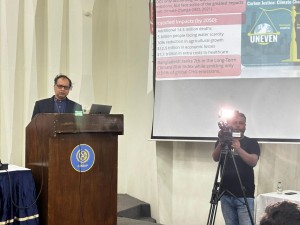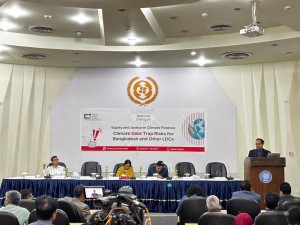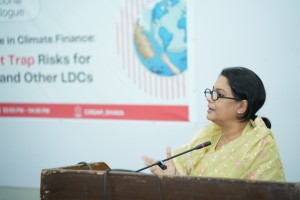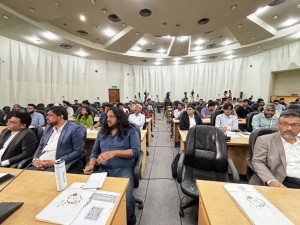Sacramento, California Oct 22, 2024 (Issuewire.com) - A new report by Change Initiative (CI) reveals that the current system of climate finance is pushing Bangladesh and other Least Developed Countries (LDCs) into a debt trap, hindering their ability to address the urgent challenges posed by climate change. The report found that Bangladesh had zero per capita climate debt in 2009, which has soared to $79.61 (9485 BDT) in 2022.
These critical findings were discussed at a national dialogue hosted by CI on October 20, 2024, at the CIRDAP CICC Venue in Dhaka. The event convened policymakers, donor agencies, civil society representatives, and climate finance experts to explore solutions for sustainable climate finance in LDCs. The dialogue focused on advocating for a shift towards grant-based climate finance and promoting international cooperation to ensure that Bangladesh and other LDCs are not saddled with unsustainable debt.
Chief Executive of Change Initiative, M. Zakir Hussain Khan while presenting the keynote said “Climate change is a global problem, which cannot be bounded by geographical boundaries. The impact of this change on farmers in Mymensingh, Gaibandha in Bangladesh is the same as it is for farmers in Assam-Tripura-Rajasthan in India. Therefore, in order to deal with this change, sustainable action is necessary to protect natural rights for the larger interests by submerging the small interests.”
Talking about recommendations he stated "We need a fundamental shift in climate finance. LDCs require $480 billion annually by 2030, with adaptation finance being 100% grant-based from 2025. Debt cancellation and innovative mechanisms like 'Debt-for-climate swaps' are crucial for freeing up resources for climate action."
The event's Chief Guest, Syeda Rizwana Hasan, Honorable Adviser, Ministry of Environment, Forest and Climate Change, emphasized the importance of climate justice and called for greater international support to address the challenges faced by vulnerable nations.
Rizwana Hasan in her speech said "Climate finance must be about justice and equity. It's not enough to simply provide funds; we must ensure that the resources reach the most vulnerable communities and empower them to build resilience against climate change. When the entire model is ultra-capitalistic, achieving true justice and equity in climate finance becomes incredibly difficult. We need to critically examine the inherent conflicts of interest within this system and explore alternative approaches that prioritize the needs of the most vulnerable over profit "
She also said "Young people are demanding climate justice, and they are right to do so. We must empower them so that they don’t fall into corporate traps. They will be pioneer in nature-based solutions to build a climate-resilient future."
Dr. S.M. Munjurul Hannan Khan, Executive Director of NACOM presided over the event.
The report, "Equity and Justice in Climate Finance: Climate Debt Trap Risks for Bangladesh and Other LDCs," finds that LDCs are disproportionately reliant on loans rather than grants for climate action, despite contributing minimally to global emissions. This reliance on debt financing is exacerbating their economic vulnerabilities and diverting resources from essential public services.
Key findings from the report include:
- Bangladesh's multilateral per capita climate debt ($2.04) is three times higher than the average for other climate-vulnerable LDCs ($0.85). This underscores the significant financial burden facing the country.
- Only 30.74% of pledged international climate funds have been disbursed to LDCs, leaving them with insufficient resources to implement adaptation and mitigation measures.
- High Loan-to-Grant Ratio: For every dollar of climate finance received as a grant by Bangladesh, 95 cents are in the form of loans, creating a substantial debt burden.
- There is a global imbalance in climate finance, with more funding directed towards mitigation projects – which are often financed through loans – rather than adaptation efforts that are crucial for building resilience in vulnerable communities. The average adaptation-mitigation ratio for LDCs is 0.74:1, which should’ve been 1:1.
The dialogue featured a diverse range of speakers from organizations such as UNDP, the Embassy of the Kingdom of the Netherlands, IDCOL, BRAC, WFP, the World Bank, Transparency International Bangladesh (TIB), Bangladesh Environmental Lawyers Association (BELA), BRAC University, BRAC Bank, Bangladesh Supreme Court and Md. Rafiqul Islam, Managing Director (Additional Secretary), Bangladesh Climate Change Trust. Summary of Points.
Change Initiative urges immediate action to reform the climate finance landscape, including:
- Increasing international climate finance commitments, with a strong emphasis on grant-based financing.
- Implementing debt relief mechanisms for LDCs burdened by climate-related loans.
- Reforming multilateral financial institutions to offer more favorable financing terms to LDCs.
- Promoting greater transparency and accountability in climate finance flows.
- Investing in innovative financing mechanisms, such as climate resilience bonds and debt-for-climate swaps, to support LDCs in their climate action efforts.
The event will also include a certificate awarding ceremony for journalists who completed CI's "Training on Economic and Financial Journalism.
To learn more about the report and the national dialogue, please visit: https://www.changei.org/climate-justice-in-climate-finance-the-threat-of-climate-debt-trap.html
Media Contact
Change Initiative maisha@changei.org +8801302843523 Mohakhali DOHS https://www.changei.org












